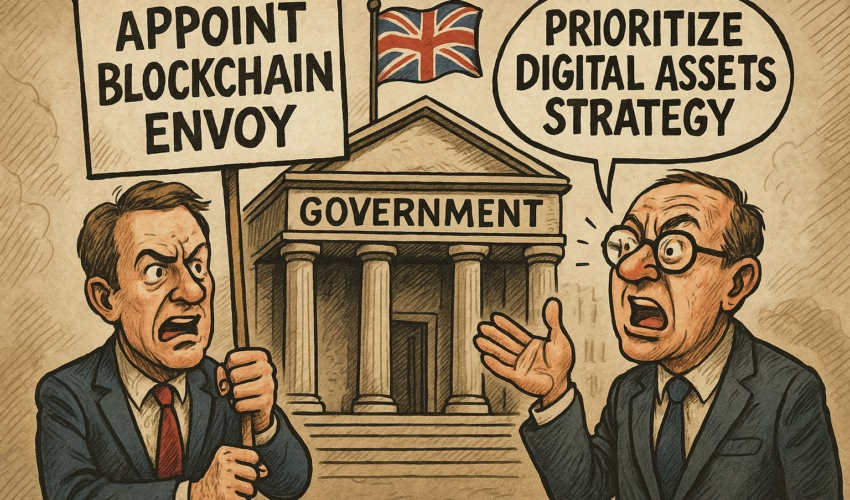Industry Calls for a “Strategic Reset” on Crypto Policy
A coalition of six leading UK digital economy and blockchain trade bodies has called on Prime Minister Keir Starmer’s office to make crypto and blockchain a strategic priority, urging the government to mirror recent U.S. policy shifts and unlock long-term economic benefits.
In a letter dated March 31, the organizations asked Varun Chandra, Starmer’s special adviser on business and investment, to spearhead a dedicated national strategy for digital assets, including the appointment of a crypto envoy and the creation of a cross-sector government-industry working group.
“With deep pools of talent, access to capital, world-class academic institutions, and sophisticated regulators, the UK provides an environment where digital assets and blockchain innovation can thrive,” the letter stated.
Inspired by U.S. Leadership Under Trump
The trade associations referenced the United States’ recent pivot on crypto policy, including the appointment of a “crypto czar” under President Donald Trump, as a model for how to coordinate innovation, regulation, and international competitiveness.
They argued that the UK’s current alignment with the U.S. on technology trade creates a “significant opportunity” to match Washington’s ambition in blockchain, digital assets, and emerging financial technologies.
The letter was signed by:
-
UK Cryptoasset Business Council
-
Global Digital Finance
-
The Payments Association
-
Digital Currencies Governance Group
-
Crypto Council for Innovation
-
techUK
Together, the coalition represents a broad cross-section of blockchain, fintech, and digital payments firms, calling for urgent policy attention.
Key Recommendations for UK Policymakers
The group proposed several concrete steps:
-
Appoint a UK Blockchain & Digital Assets Envoy to coordinate strategy across departments
-
Create a national crypto action plan, supported by a government “concierge” service to attract high-growth firms
-
Launch a high-level government–industry–regulator forum for ongoing engagement and rapid-response policymaking
-
Integrate blockchain policy with strategies for AI, quantum computing, and cybersecurity, recognizing shared infrastructure and application areas
The letter positions crypto not just as a financial tool, but as a core component of the UK’s broader innovation economy.
Economic Impact Potential: £57 Billion at Stake
The trade bodies estimate that blockchain and crypto could add £57 billion ($73.6 billion) to the UK economy over the next decade. Globally, the sector could boost GDP by as much as £1.39 trillion ($1.8 trillion) by 2030, according to their projections.
They argued that by acting now, the UK can solidify its role as a global leader in the digital economy, avoiding the risk of falling behind more aggressive jurisdictions like Dubai, Singapore, and parts of the European Union.
Industry Voices Warn of Declining Momentum
Tom Griffiths, co-founder of crypto compliance advisory firm BitCompli, echoed the coalition’s call in a LinkedIn post, noting that the UK’s Financial Conduct Authority (FCA) risks losing pace in the international regulatory race.
“The FCA has a lot of talent and a good sight of future plans, but the UK is definitely losing pace with Dubai, Singapore, and other EU jurisdictions,” Griffiths wrote.
He added that the UK needs to act now or risk missing out on the long-term economic and technological benefits of digital asset adoption.
Final Thoughts: Will the UK Seize the Moment?
As other nations move quickly to build infrastructure and policy frameworks for Web3 innovation, the UK’s ability to stay competitive may hinge on whether it embraces a proactive, centralized digital asset strategy—or continues with fragmented, cautious regulation.
The letter to Downing Street reflects a growing consensus among industry leaders: digital assets are no longer niche—they are nation-shaping.
Whether Starmer’s government will respond with the urgency the sector is calling for remains to be seen.












